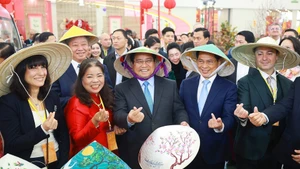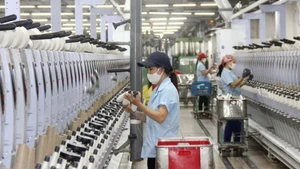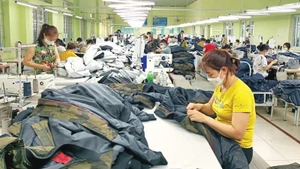Alongside these inspiring tales, however, there remains a need for greater attention to older individuals who still possess the drive and capacity to work or start a business.
Among more than 134,325 senior citizens (aged 60 and above) currently living in Da Nang, it is estimated that over 25% are participating in the labour market. Some are leading businesses with annual revenues in the hundreds of billions of dong, while others are energetically launching new ventures.
Start-up Journey of the elderly
The start-up story of Tran Thi Thong (75 years old, Cam Le District, Da Nang City) is that of a woman who dared to launch a business at the age of 72. Her motivation was not driven by a desire for wealth or the pressure of making a living, but by her own journey of overcoming a life-threatening illness—and a heartfelt wish to share the value of health with the community.
In 2004, she was diagnosed with cancer and underwent surgery to remove one lung. Told she might not live beyond two years, she turned to natural grains. After five years, my hair started to grow back, and my health gradually stabilised. That marked the birth of the “Thong's Twelve-Grain Powder” brand.
Today, she sells an average of 60 kilograms a month, mostly through direct orders and word of mouth.
The success of her product is not just a testament to her perseverance, but also an illustration of how older people can harness their knowledge and experience. Her powder combines 16 types of grains, each with specific health benefits, carefully selected using the medical knowledge she gained during her time in the revolution and over the course of her life. Even the colour scheme of her product packaging and her business cards were designed using insights from her years working in the printing industry. “Age is a school in itself,” she reflected. “Real-life experience has shaped what I do today.”
Though Thong’s story may be a personal one, it reflects qualities shared by tens of thousands of older adults in Da Nang who excel in business and production, qualities such as integrity, legitimate wealth-building, a spirit of service, vast experience, and unyielding determination. But above all, they share a profound desire to contribute to the community and the country, even as their hair greys and their skin wrinkles.
Across Da Nang, many experienced elders are challenging age stereotypes and applying their knowledge. One such example is Van Phu Chinh, Chairman of the Board of the Water Resources Technical Development and Consulting JSC (WATEC), who, at the age of 65, remains dedicated to natural disaster warning projects that help protect local communities.
Another is Ho Thi Thang, Director of Phuoc Duc Thang Import-Export Company, who, at 72, continues to immerse herself in the hustle and bustle of business, not merely for economic gain, but “to earn money as a way to give back to life and support charitable work.”
Boosting senior economy
According to Pham Quy, Chairman of the Da Nang Association of the Elderly, the city currently has around 3,040 elderly households recognised for their outstanding achievements in agricultural production and business at various levels. More than 10% of businesses operating in the industrial and construction sectors are legally represented by senior citizens. Additionally, over 800 elderly individuals serve as owners or key managers of small-scale industrial and handicraft production units. In the commercial and service sectors, more than 1,194 enterprises and 3,042 individual business households are owned or managed by elderly people. These figures underscore the vital role senior citizens in Da Nang are playing as an active and productive segment of the labour force.
However, the reality also shows that older residents in urban areas face certain difficulties and challenges in finding employment, particularly in the field of entrepreneurship.
“Despite encouraging results from the movement promoting elderly entrepreneurship, the number of senior start-ups in the city remains very limited, mostly confined to the agricultural sector,” Pham Quy noted.
Tran Thi Thong added: “One of the challenges of starting a business at this age is finding investment opportunities, as many are hesitant due to concerns about our age and perceived limits to long-term contribution.”
The current urban economic structure is focused on non-agricultural sectors, which demand a high level of technological adaptability and digital literacy. This inadvertently creates age-related barriers for older adults, including digital skill gaps, declining health, and slower adaptability, making it harder for them to access job and business opportunities.
Even traditional wholesale businesses run by elderly people in neighbourhoods, traditional markets, and trade-service cooperatives are now facing fierce competition from modern retail and wholesale models.
Furthermore, many older individuals engaged in industrial and handicraft production are facing financial difficulties, particularly in accessing bank loans. This is largely due to a risk-averse mindset among credit institutions. “Although the national action programme for the elderly and Da Nang’s local implementation plan include supportive policies, there remain significant gaps in actual execution,” Pham Quy pointed out.
A recent survey on policy implementation in Da Nang shows that the city has a relatively strong social welfare system that meets the basic needs of the elderly in terms of healthcare, welfare, and living support, creating a safety net that allows them to live with peace of mind and continue contributing to society.
However, in recent years, central and local-level policies and support programmes specifically aimed at empowering elderly people with the capacity and desire to work or start businesses have not been clearly defined or effectively implemented, despite explicit goals targeting this population group.
This has resulted in a policy gap, one that overlooks the continued capacity and desire of senior citizens to contribute their experience, intellect, and dedication to economic development. This gap is particularly concerning in the context of Viet Nam’s rapidly ageing population.
















